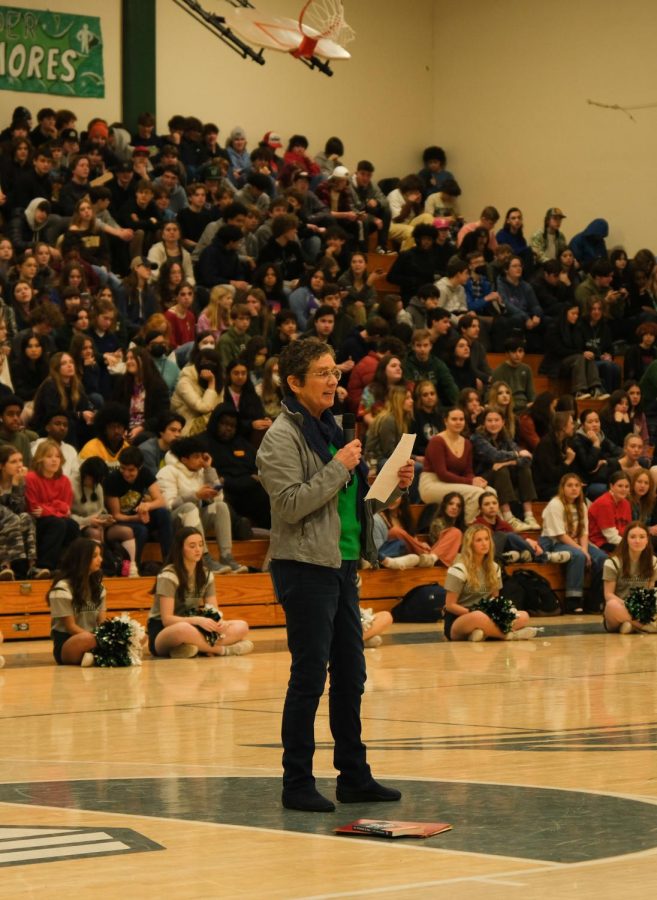“Women do cool things too”: Women’s athletics at IBW and beyond
March 24, 2023
Zorina Johnson has been wrestling for 11 years. As a female wrestler, many of her opponents have been boys, and as a girl in a male-dominated sport, she expresses how there is an expectation for every boy to beat her.
“I will hear dads shame their sons if they get beat by a girl, or before my match I will hear coaches be like ‘you cannot lose to her, she’s a girl,’” Johnson said. “And there’s just an ongoing pressure that men are better at sports and more athletic and aggressive.”
Women continue fighting for their place in sports even as we pass the 50th anniversary of Title IX—the federal law that eliminates discrimination on the basis of sex, sexual orientation or gender expression in schools, local and national education agencies and any other institution that is federally funded by the US Department of Education.
This landmark law provided many new resources and opportunities for people who were not cis, straight men, such as establishing girls’ sports and making sure that girls had an equal opportunity to participate in sports. While Title IX was enacted in 1972, this doesn’t mean things changed overnight.
Lucy Bledsoe is one of the pioneers that helped instill these changes and pushed for representation. Bledsoe is a Wilson alum who graduated in 1975. She recently returned to her alma mater after releasing a novel based on her experience at then-Wilson High School. Her book, No Stopping Us Now, illustrates her experience bringing the women’s basketball team to her school.
Although Title IX was passed in 1972, there weren’t many opportunities for girls in sports at Wilson until 1974. Bledsoe shared that her battle was not easy, but in the end, she saw success. An official women’s basketball team was established in 1974 and the team won the state championship that same year.
Bledsoe may have been one of the first female athletes at IBW to fight for fair representation, but she certainly wasn’t the last. Cia Kidoguchi is a junior at IBW who wrestles for Wells as well as manages the varsity baseball team. Kidoguchi shares that the battle for women to be seen and respected in sports continues to persist.
“I think that we are paving away. But people paved the way for us. I think we can respect who has come before us, but we can also be recognized for still fighting for our sport,” Kidoguchi said. “Title IX is great to be able to do the sport. But that doesn’t mean we still get the same respect in the sport. I think there’s a difference.”
There is still a stigma present in women’s sports. Whether that be press, attendance at games, or equal pay, there’s still a disconnect between men’s and women’s sports. Helen Mildenberger, sophomore and athlete on the soccer, basketball and track teams, said, “The environment that men’s sports has created makes it more socially acceptable to go [to those games].”
“I think they’ve been around longer and I think that men’s sports are more widely respected than women’s sports,” adds Dana Savage, a junior and basketball, soccer, and tennis player.
Autumn Hart, a sophomore who plays on the basketball and soccer teams at IBW, shares an experience from last year where it seemed that the men’s team got priority over the women’s team. “Last year when we played our Lincoln game, our rival game for soccer, we were supposed to be at home, and then we got moved and then we got moved back and then we were just playing before the boys,” Hart said. “And it was just like, is anyone going to come because they want to see the boys game?”
Mildenberger explains how the press also plays a role in this disparity. She explains that for the women’s teams to get press and recognition, they usually have to be on a winning streak or be having a winning season. This can add additional pressures to the team as well. She compares this with the men’s teams, “But the boys teams can just get the same amount of press no matter what they do, no matter if they have a winning season or a losing season. So it’s definitely harder to get attention [depending] on how you’re doing in your season.”
And while there are still disparities that exist between men and women in sports, that hasn’t stopped athletes from breaking barriers.
Johnson, a freshman here at IBW, plays on the football team, wrestles, runs track and is on the swim team. She shared that it has been the support of her brother and the IBW community that helps her make her mark in sports.
“I’m really grateful to be a part of the Ida B. Wells community because it has allowed me to do so many more things that I could’ve ever dreamed of,” Johnson said. “It’s really amazing.”
Many of these athletes have found inspiration from one another as well, supporting each other and building a community within the world of sports.
“I’ve had a lot of people to look up to,” Hart said. “Whether that’s like people that have graduated, or people that I’ve been able to play with.”
Johnson continues on to this point, “Girls are playing so many sports and so many girls are getting out there and it’s really heartwarming and inspiring.”
There are women around the world breaking boundaries and working tirelessly to create equal opportunities for girls in sports. U.S. soccer player Megan Rapinoe has been fighting for equal pay for professional athletes and sued the U.S. Soccer Federation demanding equal pay for female athletes.
“It’s really important because they won, and we don’t often see a lot of battles that come out with positive outcomes,” Mildenberger said. “And I think that even though it’s just one piece of the puzzle, it can start a chain reaction and help a lot more sports be seen and heard by the people.”
Women have come a long way in sports, from 1972, when Title IX was passed, to 1974 when the then-Wilson women’s basketball team won their first state championship, to where we are now with established women’s teams across multiple sports and the ability for girls to join previously male-dominated sports. However, there is still a way to go and there are still people fighting for equality.
“I think women are still attempting to gain respect for the amount of work we put in to be respected in our sport, and I think that’s something that needs to be recognized,” Kidoguchi said.
As we celebrate Women’s History Month this March, it is important to celebrate and acknowledge how far women have come while also recognizing the disparities that continue to persist and the people who continue to pave the way.
Johnson concludes, “To all the girls thinking about trying a sport: you can do it. No matter what sport, you can do it. You are capable and it’s so fun.”




Lucy Bledsoe • Mar 27, 2023 at 7:32 am
Zoe, you are such a good writer! I see a brilliant career ahead, whether in journalism or something else. Thanks for all your good work.